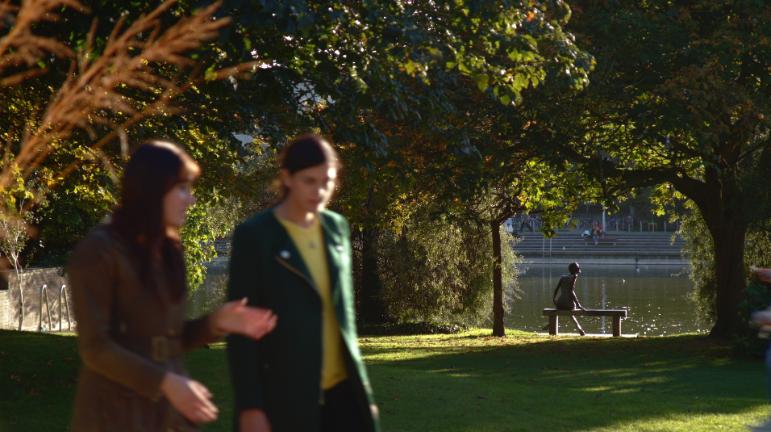Summary
In recent years, Ireland has experienced water supply shortages, and they are forecast to become more frequent. To address this, Dr Sarah Cotterill’s research explored how Ireland can conserve water, and the benefits of doing so. Based on her findings, Dr Cotterill produced a policy brief for An Fóram Uisce (the Water Forum) including ten clear recommendations – around technology, regulation and education – on how domestic water conservation measures could be implemented in Ireland. Through a programme of outreach, including policy workshops and media appearances, Dr Cotterill is working to ensure these recommendations are translated into policy, so that we can save water and protect the environment.
Research description
 Ireland’s water availability is under pressure from population growth and climate change. The areas with the lowest rainfall are also the most densely populated, exacerbating the issue. Irish Water, the national water utility, reported that 60% of their water supply systems are typically under pressure, and more still when there's a drought.
Ireland’s water availability is under pressure from population growth and climate change. The areas with the lowest rainfall are also the most densely populated, exacerbating the issue. Irish Water, the national water utility, reported that 60% of their water supply systems are typically under pressure, and more still when there's a drought.
This prompted An Fóram Uisce – “The Water Forum”, a statutory body formed to facilitate stakeholder engagement and debate on issues relating to water – to fund a programme of research on domestic water conservation in 2021. Awarded funding under this scheme, Dr Sarah Cotterill’s research sought to review available water-conservation technologies, summarise relevant national and EU legislation, explore how to implement water efficiency labelling, and outline ways to incentivise water conservation measures.
Through this review of academic and policy literature, Dr Cotterill found that saving water yields a range of environmental, economic and wider societal benefits. For example, reducing water use would reduce the volume of wastewater discharged from a property, helping to mitigate capacity issues and sewer overflows. The research showed that a fifth of the energy used in Irish homes is used for heating water, and that a small reduction in water use could lead to significantly lower greenhouse gas emissions, if scaled up across all Irish homes.
Dr Cotterill also found that the average water use in Ireland (of 133 litres per person per day) is 20-30% higher than in similar EU countries, like Belgium and Denmark. However, homeowners often don’t know how much water they’re using, and the gulf between those who use the most and the least water is larger than for any other utility. Technology – like low-flow taps and showers, smart meters, and rainwater harvesting – could enable substantial water saving, but only when used alongside a sustained and consistent programme of education, and with regulatory drivers to incentivise uptake of these technologies.
Based on her findings, Dr Cotterill developed ten recommendations to strengthen regulation and policy, to facilitate agencies to engage, and to improve public awareness of water conservation. These recommendations – which include steps like updating building regulations and introducing smart metering – are presented in a policy brief on An Fóram Uisce’s website, alongside the research report (for which she received the 2022 NovaUCD Consultancy of the Year Award).
Dr Cotterill presented her key recommendations to An Fóram Uisce's Plenary Committee, where members commented that the report was "practical and pragmatic", "comprehensive" and "concisely crafted".
 Having published her report, Dr Cotterill was invited to speak to students and teachers at Bridgetown College in Wexford, as part of the school’s campaign to highlight issues around water use, waste and quality. The teacher who organised the event said: “all agree that the talk was very interesting, and students captivated. Hopefully this will spur on some action, based on your recommended resources. It was great to get your input into the new school design too. We will have to lobby the principal and department architects too!”
Having published her report, Dr Cotterill was invited to speak to students and teachers at Bridgetown College in Wexford, as part of the school’s campaign to highlight issues around water use, waste and quality. The teacher who organised the event said: “all agree that the talk was very interesting, and students captivated. Hopefully this will spur on some action, based on your recommended resources. It was great to get your input into the new school design too. We will have to lobby the principal and department architects too!”